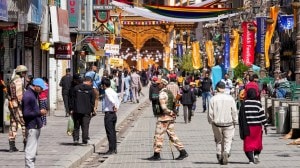Detainees may be denied evidence for defence
When Khalid Sheik Mohammed and other alleged co-conspirators in 9/11 seek to represent themselves in military...

When Khalid Sheik Mohammed and other alleged co-conspirators in 9/11 seek to represent themselves in military commissions trial in Guantanamo Bay, they may be barred from reviewing highly classified evidence and might not have access to the intelligence agents who interrogated them, according to the Pentagon’s Office of Military Commissions.
The Justice Department has argued that the Supreme Court’s decision last week granting the Guantanamo detainees the right to challenge their detentions in US courts should not affect the military trials process. The department contends that the government plans to go ahead with military commissions for those who are facing war crimes charges.
Though the top legal advisor for the commissions process, Air Force Brig Gen Thomas Hartmann, has said that the trials will be “fair, just and transparent” and that detainees would have full access to the evidence against them, Pentagon officials have now backed off of those claims. The Office of Military Commissions said last week that defendants representing themselves might not get access to information about their interrogators.
“If classified information is presented to the jury, the accused will see it, no exceptions,” according to the Office of Military Commission’s responses to Washington Post questions about how the military commissions will deal with classified evidence in the 9/11 case. But a further explanation reveals that classified contents of certain materials could be replaced by summaries and blacked-out documents. “It is possible that an accused representing himself will not be able to directly review some evidence; in such circumstances, his standby defence counsel might be involved.”
It is unclear, however, what role the standby counsel will be allowed to play and how far the judge would let him go in cooperating in their client’s defence. Mohammed, Tawfiq bin Attash and Ali Abdul Aziz Ali have been approved to represent themselves at trial; Ramzi Binalshibh and Mustafa Ahmed al-Hawsawi have hearings pending to determine their competency to do so.
The defendants, some of whom have already said they were tortured by CIA agents while held in secret prisons overseas, almost certainly will request to use highly classified evidence relating to their captures and alleged confessions under duress. Legal experts said that, in such cases, it would be critical to challenge the confessions as illegal because of coercion, even if the government does not seek to use them, because of the legal theory that if the defendant was abused, all of his following statements are then tainted and inadmissible.
But the Office of Military Commissions will not guarantee that the defendants will be able to question and confront their interrogators or captors, saying that the “identities of intelligence interrogators are normally classified”.



- 01
- 02
- 03
- 04
- 05



























